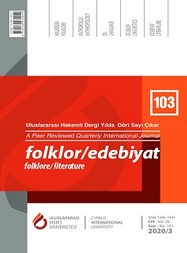Türkülerin Başına Gelenler: Politik-İdeolojik Sebeplerle Değiştirilen Türküler Üzerine
What Happened to Folk Songs: About Folk Songs Changed for Political-Ideological Reasons
Author(s): Mustafa DinçSubject(s): Politics, Customs / Folklore, Studies of Literature, Turkish Literature, Cultural Anthropology / Ethnology, Politics and Identity
Published by: Uluslararası Kıbrıs Üniversitesi
Keywords: folk song; politics; ideology; censorship; adaptation;
Summary/Abstract: Folk songs are common examples of folk poetry in many areas of social life and are said in almost every subject. As a result of this prevalence, folk songs, which perform many overt or secret functions in line with all the functions of folklore products, have been used to reflect political-ideological ideas from time to time and even some or all of their lyrics have been changed for this purpose. In Turkey, folk songs, which have been restructured by right or left political ideologies, have been used as a propaganda tool in times of intense political activity or in election squares. In the study, which briefly emphasized the political and social conditions of the folk tradition in our country since the second half of the twentieth century, it was determined that it was replaced by political-ideological purposes by the performers who belonged to different ideological trends, especially from the 60s until today. They were compared with their performances and repertoire records, and then the ways in which these changes were made were discussed. In this respect, it was determined that these changes were made in the sample folk songs, which were used as arguments of some political movements in various periods by making significant changes to their lyrics for political-ideological reasons, in the form of secularizing, conservationizing, articulating current ideological jargon to the verbal texture of the folk songs and adapting new lyrics to the melodic structure of them. The study also required that this situation be considered completely separate from the concepts of variant or version; it was concluded that it would be more accurate to consider the above practices as a censorship or adaptation.
Journal: Folklor/Edebiyat
- Issue Year: 26/2020
- Issue No: 103
- Page Range: 483-508
- Page Count: 26
- Language: Turkish

